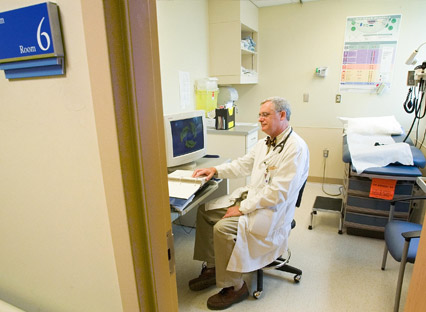Why do so many people miss GP appointments?
Experts say age, gender and social status are factors, along with changing attitudes to NHS

A free daily email with the biggest news stories of the day – and the best features from TheWeek.com
You are now subscribed
Your newsletter sign-up was successful
A rise in missed GP appointments is costing NHS England £216m a year, according to the latest NHS Digital data.
Of the 307 million appointments booked every year, one in 20 is missed with little or no notice, making it impossible to offer those slots to other patients, reports The Guardian. NHS England says that, at roughly £30 an appointment, the total amount of money wasted could cover the annual salary of 2,325 full-time family doctors.
And the problem is growing, with 15 million appointments missed in 2017, up from 12 million in 2014.
The Week
Escape your echo chamber. Get the facts behind the news, plus analysis from multiple perspectives.

Sign up for The Week's Free Newsletters
From our morning news briefing to a weekly Good News Newsletter, get the best of The Week delivered directly to your inbox.
From our morning news briefing to a weekly Good News Newsletter, get the best of The Week delivered directly to your inbox.
So why do so many people fail to show up for their appointments?
Studies have found that gender, age, social class and when an appointment was booked are all factors in how likely a patient is to attend.
According to a study of more than 550,000 people conducted for The Lancet Public Health journal in 2017, “no-shows” were particularly common among two age groups - people aged 16 to 30, and those older than 90.
Ranjit Gill, a GP from Stockport, believes younger people are more likely to miss appointments because their attitude to the health service differs from that of previous generations. “The NHS is now, for our younger population, seen as a consumer service, a bit like John Lewis and so perhaps valued differently to the way our older population see the NHS,” Gill told the BBC.
A free daily email with the biggest news stories of the day – and the best features from TheWeek.com
The Lancet study also found that appointments booked two or three days in advance were more likely to be missed than those made two weeks ahead.
The researchers added that there was “clear evidence” patients who repeatedly miss appointments are more likely to be socially disadvantaged.
Commenting on the findings, GPC chair Dr Richard Vautrey called for understanding rather than condemnation. “Those from lower socioeconomic backgrounds are more likely to miss appointments and many of these patients are often under pressure financially or in other parts of their lives, factors that often contribute to their non-attendance,” he said.
Speaking to The Guardian, Prof Helen Stokes-Lampard, chair of the Royal College of GPs, said there may be “many reasons” why a patient might miss an appointment, and that in some cases it can be “an indication that something serious is going on for that individual”.
However, she added: ‘We would urge patients to let us know if they can’t attend as soon as possible, so that we can offer that time to someone else who really needs it.”
-
 At least 8 dead in California’s deadliest avalanche
At least 8 dead in California’s deadliest avalancheSpeed Read The avalanche near Lake Tahoe was the deadliest in modern California history and the worst in the US since 1981
-
 Political cartoons for February 19
Political cartoons for February 19Cartoons Thursday’s political cartoons include a suspicious package, a piece of the cake, and more
-
 The Gallivant: style and charm steps from Camber Sands
The Gallivant: style and charm steps from Camber SandsThe Week Recommends Nestled behind the dunes, this luxury hotel is a great place to hunker down and get cosy
-
 A real head scratcher: how scabies returned to the UK
A real head scratcher: how scabies returned to the UKThe Explainer The ‘Victorian-era’ condition is on the rise in the UK, and experts aren’t sure why
-
 How dangerous is the ‘K’ strain super-flu?
How dangerous is the ‘K’ strain super-flu?The Explainer Surge in cases of new variant H3N2 flu in UK and around the world
-
 The ‘menopause gold rush’
The ‘menopause gold rush’Under the Radar Women vulnerable to misinformation and marketing of ‘unregulated’ products
-
 How the care industry came to rely on migrant workers
How the care industry came to rely on migrant workersThe Explainer Government crackdown on recruiting workers abroad risks deepening care sector crisis, industry leaders warn
-
 Could medics' misgivings spell the end of the assisted dying bill?
Could medics' misgivings spell the end of the assisted dying bill?Today's Big Question The Royal College of Psychiatrists has identified 'serious concerns' with the landmark bill – and MPs are taking notice
-
 Washwood Heath: Birmingham's pioneering neighbourhood health service
Washwood Heath: Birmingham's pioneering neighbourhood health serviceIn the Spotlight NHS England chair says there is a 'really good argument this is the model for the future'
-
 The UK's first legal drug consumption room
The UK's first legal drug consumption roomThe Explainer 'Potentially transformative moment in UK drugs policy' as The Thistle opens in Glasgow
-
 How can the UK solve the adult social care crisis?
How can the UK solve the adult social care crisis?Today's Big Question New commission announced to turn our buckling care sector around: yet more delay or finally a way forward?